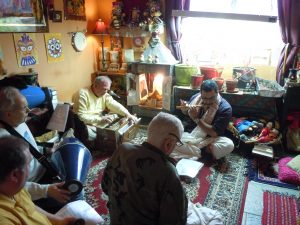Article by: Narasimha dasa
Submitted by: Yasoda nandana dasa
Great devotees in our Gaudiya Vaisnava Sampradaya never desire to end their lives out of mundane frustration or pain, like conditioned souls often do. Such an idea is certainly a ridiculous apa-siddhanta concoction.
Sometimes we hear that maya-iskcon is full of pure, hardworking devotees. This is possible only if they have carefully avoided hearing from its leaders, most of who have read Tamal’s writings, heard his speeches and followed his advice. Tamal claims that Srila Prabhupada was moaning in pain and asking for poison to end His life. This is highly offensive apa-siddhanta. Because most disciples of the gbc have heard such offensive apa-siddhanta without protest and without counteracting it, most are likely implicated in guru-aparadha and apa-siddhanta.
“The living entity in his conditioned stage identifies himself with the body, but when he identifies himself with the Lord within himself, he becomes just as free as the Lord, even while in the body.”
Commenting on this verse from the Upanishads and the Bhagavad-gita verses describing how one “lives happily in the city of nine gates”, Srila Prabhupada comments, “Therefore, when one takes to Krishna consciousness, one at once becomes aloof from bodily activities. In such a controlled life, in which deliberations are changed, he lives happily within the city of nine gates… Therefore, a Krishna conscious person is free from both the outer and inner activities of the material body.”
In the case of Chota Haridas, he committed suicide due to his intense feelings of separation from Lord Chaitanya. After Lord Chaitanya banished Chota Haridas from His personal association, Chota Haridas waited for several months, hoping Lord Chaitanya would call him back to the fold. After one full year he realized Lord Chaitanya would never do so, although senior devotees had begged Him on behalf of Chota Haridas Prabhu. Finally, Chota Haridas went to Prayag and ended his life in this world by drowning at the most sacred confluence of the Yamuna and the Ganga.
Why was he rejected by Sri Chaitanya Mahaprabhu, the most merciful? According to Krishnadas Kaviraja Gosvami, Chota Haridas had violated strict sannyasa protocol by visiting the home of an elderly widow who was known as a highly exalted pure devotee. He had gone there to beg alms for Lord Chaitanya. She was apparently alone at the time, and they spoke on the porch for a few moments. Nonetheless, Lord Chaitanya took this as a serious breach of sannyasa behavior.
Although Srila Prabhupada made many concessions for devotees living in the modern western world, he never allowed sannyasis to associate with women. In fact, in Vedic culture, even strict Brahmin householders avoid all types of association with women other than their own wives. Srila Prabhupada’s advice for all his disciples was to deal with women only for the sake of important services for the preaching mission, as Chota Haridas was doing. Srila Prabhupada was thus more lenient than Lord Chaitanya, but he never agreed that sannyasis could associate with women, especially not in solitude or
close by–wherein bodies touch. Such association is strictly forbidden for sannyasis under all circumstances.
Srila Raghunatha das Gosvami joined Lord Chaitanya’s mission at a young age and left behind his young, beautiful wife and fabulously wealthy family. He was the personal associate and servant of Srila Swarupa Damodar Gosvami and Sri Chaitanya Mahaprahu. When Lord Chaitanya and Srila Swarupa Damodar both disappeared around the same time in Jagannatha Puri, Raghunatha das Gosvami was very distraught, transcendentally. His intense feeling of separation, the highest mood of devotional ecstasy, was unbearable for him. He thus decided to commit suicide in Vraja Mandala by jumping off a cliff on Govardana. But he first wanted to meet Srila Rupa Gosvami and Srila Sanatana Gosvami. These two great devotees inspired him to constantly describe Lord Chaitanya’s pastimes in Jagannath Puri, and in this way they helped infuse in Srila Raghunath das Gosvami the desire to remain alive in Vrindaban and preach the glories of Lord Chaitanya Mahaprabhu.
Srila Krishnadas Kaviraja writes that Srila Raghunatha das Gosvami offered obeisance to 2,000 Vaishnavas a day. He didn’t just say “PAMHO” but rather offered his full dandavats by lying down flat in the dust of Vrindaban.


